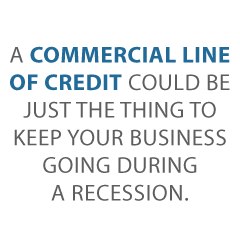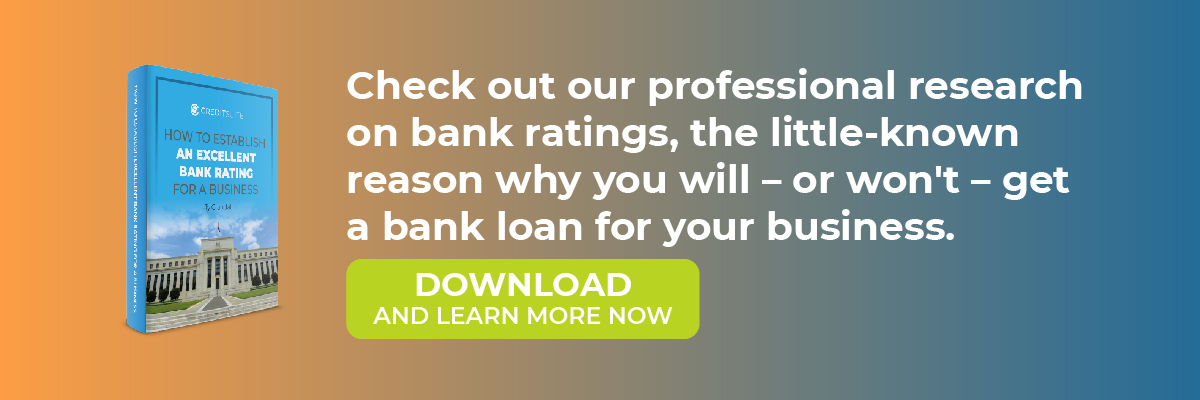Covid-19 has turned the world topsy turvy. There is no way around it. Most businesses need a little extra financial cushion at the very least. Most need much more than that. What happens in this post COVID-19 economy is literally unfolding as we watch. A commercial line of credit could be just the thing to keep your business going during a recession.
Get a Commercial Line of Credit Fast
The thing is, most business owners need money right now. That means you need the fastest, most cost-effective commercial line of credit that you can get. Why a line of credit rather than a loan? There are a few reasons, but one main reason.
Commercial Line of Credit vs. Loan
 The most basic definition of a commercial line of credit is that it is a revolving credit, similar to a credit card. You have a limit and continuous access to that limit while making payments only on the portion you use each month.
The most basic definition of a commercial line of credit is that it is a revolving credit, similar to a credit card. You have a limit and continuous access to that limit while making payments only on the portion you use each month.
For example, if you have a $10,000 line of credit, you can use however much of those funds you need each month for whatever you want, unless your lender issues some sort of restriction.
If you use $2,000, then when you get your statement you will have to pay $2,000 plus the interest, rather than a payment plus interest on the entire amount of the loan.
If you were to pay $1,000, then spend another $500, you would pay on the $1,500 balance the next month. Your payments change as your balance changes. Just like with a credit card.
What is the advantage of a line of credit over a term loan? Flexibility, hands down. With a line of credit, you do not have to repay or pay interest on any amount that you do not use. You have access to the funds as needed, but you do not have to repay the entire amount unless you use the entire amount.
Commercial Line of Credit vs. Credit Cards
Now, you’re probably thinking that credit cards are super easy to get, and they work the same way. It’s revolving credit. You only use what you need. You only pay back what you need.
Why is one better than the other? In some cases, a credit card may be the better option. This is a choice to make based on several different factors.
The main difference between the two that most borrowers need to know is that a line of credit typically has a lower consistent interest rate. However, there are no perks like 0% interest or cash back that you sometimes see with credit cards.
Another benefit with a credit card is that it is typically unsecured credit, meaning you do not have to have collateral. Many credit lines do require security, or collateral.
Middle Ground: Credit Line Hybrid
There is middle ground between unsecured and secured credit, and between a commercial credit line and credit cards. It’s called a credit line hybrid. A credit line hybrid is revolving, unsecured financing that allows you to fund your business without putting up collateral, and you only pay back what you use. It’s quickly accessible, lower interest, and high limit. It’s the best of both worlds.
Who Qualifies for this Type of Commercial Line of Credit?
Who qualifies for a credit line hybrid? Well, if you have a personal credit score of at least 685, you’re off to a good start. In addition, you can’t have any liens, judgments, bankruptcies or late payments. Furthermore, in the past 6 months you should have less than 5 credit inquiries, and you should have less than a 45% balance on all business and personal credit cards. It’s also preferred that you have established business credit as well as personal credit.
If you do not meet all of the requirements, it’s okay. You can take on a credit partner that meets each of these requirements. Many business owners work with a friend or relative to fund their business. If a relative or a friend meets all of these requirements, they can partner with you to allow you to tap into their credit to access funding.
What are the Benefits of This Type of Commercial Line of Credit?
There are many benefits to using a credit line hybrid. First, as already mentioned, it is unsecured. That means you do not have to have any collateral to put up. Next, the funding is “no-doc.” You do not have to provide any bank statements or financials.
Not only that, but frequently you can get interest rates as low as 0% for the first few months, allowing you to put that savings back into your business.
The process is pretty fast, especially with a qualified expert to walk you through it. One other benefit is this. With the approval for multiple credit cards, competition is created. That means it’s likely if you handle the credit responsibly, that you can get interest rates lowered and limits raised every few months.
Private Lenders: Another Way to Get a Commercial Line of Credit Fast
Private lenders generally operate online. They typically offer lines of credit to those with credit scores that are lower than what is generally required by traditional banks. In addition, often you can get the funds within a few days of application, rather than a few weeks. Here are a few examples.
Kabbage
Kabbage offers a credit line of up to $150,000 with no credit score required. The catch is that the interest rate is between 32 and 108%. The business must have been in existence for at least one year and have revenue of at least $50,000.
Due to the extremely high interest rate, this is really only an option for those businesses that cannot get financing due to a low or nonexistent credit score and need something immediately.
StreetShares
The credit line that StreetShares offers goes up to $100,000 for those who have a business credit score of at least 600. You also have to have been in business for at least one year, and have at least $25,000 in revenue. It requires weekly repayment.
This is a good option for smaller businesses that are okay in the credit department but have trouble meeting higher revenue criteria. Also, the interest rate minimum is lower than some. The low end at 9%.
OnDeck
If you have a credit score of at least 600 you can get a credit line of up to $100,000 with OnDeck . The interest rate is a little higher than some that require a higher credit score minimum. It ranges from 13.99 to 39.99 percent.
Again, due to the higher interest rate, this should only be an option if you cannot meet the higher credit score requirement with a lender that offers a lower interest rate.
Lending Club
The credit line at Lending Club goes up to $300,000. It requires a credit score of 600, at least one year in business, and $50,000 or more in revenue. The repayment term is 25 months. In addition, they require collateral for limits over $100,000.
This is a good option for those who meet the requirement as there is a higher limit available with collateral, and the interest rate can go as low as 6.25%. Also, the repayment terms are more manageable.
Credit Card Options
Of course, while not the perfect solution, credit cards are an option. You have to be careful, and you want to research to ensure you get the best rates and terms possible. Here are some to start with.
Brex Card for Startups
The Brex Card has no yearly fee. Also, you will not need a personal guarantee. However, this card does not work for every industry.
To determine creditworthiness, Brex checks a company’s cash balance, spending patterns, and investors. Rewards include 7x points on rideshare and 4x on Brex Travel. Also, you can get triple points on restaurants and get double points on recurring software payments. Get 1x points on everything else.
Capital One® Spark® Classic for Business
The Capital One® Spark® Classic for Business is another good one to consider. It has no annual fee, but there is also no introductory APR offer. The regular APR is a variable 24.49%. However, you can get unlimited 1% cash back on every purchase for your company and there is no minimum to redeem.
While this card is within reach if you have fair credit scores, beware of the APR. If you can pay promptly, and completely, it’s a good deal.
Ink Business Unlimited℠ Credit Card
The Ink Business Unlimited℠ Credit Card has no annual fee and a 0% introductory APR. After that expires, the APR is a variable 14.74 to 20.74%.
Earn unlimited 1.5% cash back rewards on every purchase made for your company and get $500 bonus cash back after spending $3,000 in the initial 3 months from account opening. Rewards rewards for cash back, gift cards, travel and more using Chase Ultimate Rewards®. You will need superb credit to get approval for this card.
Blue Business® Plus Credit Card from American Express
The Blue Business® Plus Credit Card from American Express has no no annual fee and either, and it also has a 0% introductory APR for the first year. After that, the APR is a variable 14.74 to 20.74%.
Get double Membership Rewards® points on everyday business purchases like office supplies or client dinners. This applies to the first $50,000 spent each year. You get 1 point per dollar after that. Your credit has to be really good to qualify.
American Express® Blue Business Cash Card
Another one to check out is the American Express® Blue Business Cash Card. It is identical to the Blue Business® Plus Credit Card from American Express. However its rewards are in cash instead of points. You get 2% cash back on all eligible purchases up to $50,000 per calendar year. After that, it’s 1%.
There is no yearly fee, and there is a 0% introductory APR for the first one year. Afterwards, the APR is a variable 14.74 to 20.74%. You will need awesome credit to qualify for this card.
Capital One ® Spark® Cash for Business
The Capital One® Spark® Cash for Business card is another great option. It has an introductory $0 annual fee for the first year. After that, it costs $95 per year. There is no introductory APR deal. The regular APR is a variable 18.49%.
You can get a $500 one-time cash bonus after spending $4,000 in the first 3 months from account opening. Also, you get unlimited 2% cash back. YOu can rRedeem any time without any minimums. You will need fabulous credit scores to qualify.
Discover it® Business Card
Another good one is the Discover it® Business Card. It has no yearly fee. There is an introductory APR of 0% on purchases for twelve months. Then, the regular APR is a variable 14.49 to 22.49%.
You get unlimited 1.5% cash back on all purchases, with no category restrictions or bonuses. Also, they double the 1.5% Cashback Match™ at the end of the first year. There is no minimum spend requirement either.
You can download transactions easily to Quicken, QuickBooks, and Excel. This one also requires great credit scores.
The thing with credit cards is, you have to be so careful. As with all debt, payments must be made on time. However, the higher interest rates make this a little harder than it typically is with a commercial line of credit.
A Commercial Line of Credit Can Help You Right Now
In this post COVID world, most business owners need money fast. A commercial line of credit is the best way for that to happen, especially if you can get a credit line hybrid. Truly, with the ability to use a credit partner, virtually everyone can access this type of funding. It’s low interest, high limit, fast access to the funds you need to make sure your business thrives regardless of the state of the economy.



